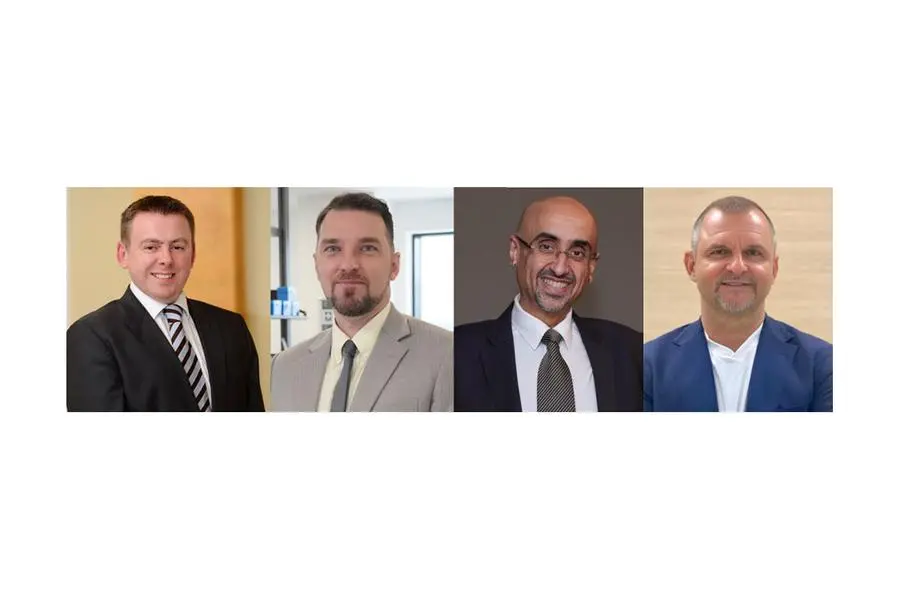PHOTO
A research collaboration between the Royal College of Surgeons in Ireland (RCSI) - Medical University of Bahrain, the Royal Medical Services (RMS), as well as the Tissue Engineering Research Group (TERG) and the Advanced Materials and Bioengineering Research Centre (AMBER) of RCSI in Dublin, is exploring innovative ways to improve the healing of diabetic skin ulcers, to reduce the risk of infection and amputation and therefore improving patient quality of life over time.
The Principal Investigator (PI), Professor Michael Keogh, Associate Professor in Human Biology and Director of Research Laboratories at RCSI Medical University of Bahrain, and Co-Principal Investigator (Co-PI), Dr Martin Maresch, Vascular and Endovascular Surgeon, Royal Medical Services, are collaborating with nine professional colleagues to develop and utilise a novel biomaterial that improves the wound healing of diabetic skin ulcers by increasing blood vessel formation and limiting the scarring of tissue. This research has so far shown that the novel biomaterial can integrate with tissue and encourage better healing than the typical clinical-used wound dressing in an ageing population.
Dr Mohammed Abdulla Al Muharraqi, Senior Consultant Oral and Maxillofacial Surgeon, RMS, and Director of Research Collaboration between RMS & RCSI Medical University of Bahrain, commented: “The research collaboration between the Royal Medical Services and RCSI Medical University of Bahrain has empowered medical professionals and students to develop impressive research projects that address pressing regional and global healthcare challenges. Through shared expertise and resources, we have published numerous impactful studies, contributing significantly to the global medical community and opening frontiers of possibilities. We are committed to fostering together innovation for a brighter, healthier future for all.”
Professor Sameer Otoom, President of RCSI Medical University of Bahrain, stated: “Research is paramount to the enhancement of patient care and improvement of the provision of healthcare services, and we are committed to fostering translational research for the benefit of patients suffering from prevalent disease complications, such as diabetic foot ulcers. We are grateful to our research partners, His Excellency Brigadier (Professor) Fahad Khalifa Al Khalifa, Commander of the Royal Medical Services, Professor Fergal O'Brien, Deputy Vice Chancellor for Research & Innovation, and Head of the Tissue Engineering Research Group, RCSI in Dublin, and their respective teams for their collaboration with this important research, for which we expect a promising outcome.”
We extend our sincere thanks for the collaborative support of our professional colleagues at RCSI Medical University of Bahrain, namely Dr Priya Das, Postdoctoral Researcher and Ms Noof Sulaiman, Research Laboratory Technician, and at the Royal Medical Services,; Dr Amr Gamal Ashour, Vascular and Endovascular Surgeon; Dr Hamad M. Ammar, Consultant Plastic Reconstructive and Burn Surgeon; Dr Mohammed Basem, Histopathology and Cytopathology Consultant; and Dr Nigamananda Dey, Laboratory Specialist, and at RCSI in Dublin; Mr Matthew McGrath, PhD candidate.
Thanks to their successful research, this particular team has been awarded a fund by Enterprise Ireland/Europe to look at another wound product from the Irish industry, for which work will begin in November 2024.
At RCSI Medical University of Bahrain, we place innovative research at the heart of enhancing human health and patient care. We are focused on clinical and patient-centred research, addressing key national, regional and global health challenges.
About RCSI Medical University of Bahrain
RCSI Medical University of Bahrain is a constituent university of the Royal College of Surgeons in Ireland (RCSI), which was established in Dublin, Ireland, in 1784. RCSI Medical University of Bahrain, an independent private university, opened its doors to a cohort of 28 medical students in 2004. Today, the purpose-built campus is home to a student body of more than 1,600 across the Schools of Medicine; Nursing and Midwifery and Postgraduate Studies and Research. It is a not-for-profit health sciences institution focused on education and research to drive positive change in all areas of human health worldwide.
For more information, please visit www.rcsi.com/bahrain



















